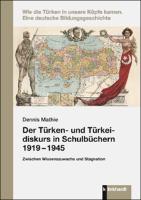Der Türken- und Türkeidiskurs in Schulbüchern 1919–1945
Zwischen Wissenszuwachs und Stagnation
Abstract
The much-vaunted interwar period after World War I and before World War II was also a phase of in-between for German-Turkish relations: It ranged from the founding of nation-state republics in Germany and Turkey together with their comprehensive social and political changes to the years of the Nazi regime and Atatürk's government. Against this background, this study examines the knowledge about Turkey that is conveyed in German textbooks for the subjects of history and geography and that is considered worthy of being handed down.
In doing so, it becomes clear how much textbook knowledge participated in the reproduction of outdated stereotypes, but also in the narrative that deals with the ""long past"" of the ""bond between our two peoples"" (Theodor Heuss). Die vielbeschworene Zwischenkriegszeit nach dem Ersten und vor dem Zweiten Weltkrieg war auch für die deutsch-türkischen Beziehungen eine Phase des Dazwischen: Sie reichte von der Gründung nationalstaatlicher Republiken in Deutschland und der Türkei samt ihren umfassenden gesellschaftlichen und politischen Veränderungen bis in die Jahre des NSRegimes und der Regierung Atatürks. Vor diesem Hintergrund untersucht die vorliegende Studie das in deutschen Schulbüchern für die Fächer Geschichte und Erdkunde vermittelte und als tradierungswürdig erachtete Wissen über die Türkei.
Dabei wird deutlich, wie sehr Schulbuchwissen an der Reproduktion überkommener Stereotype teilhatte, aber auch an der Erzählung, die von der „langen Vergangenheit“ der „Bindung zwischen unseren beiden Völkern“ (Theodor Heuss) handelt.
Keywords
Historiographie, Türkei, Bildungsbeziehungen, Schulbuch, Schulbuchwissen, Schulbuchproduktion, Osmanisches Reich, "neue Türkei"; TextbookDOI
10.35468/6003ISBN
9783781525610, 9783781560031Publisher
Verlag Julius KlinkhardtPublication date and place
Bad Heilbrunn, 2023Series
Wie die Türken in unsere Köpfe kamen. Eine deutsche Bildungsgeschichte, 5Classification
Education


 Download
Download Web Shop
Web Shop